
What numbers are saying about Indian EV Industry?
A Comparative Analysis of India’s Electric Vehicles Revolution in 2023
In the transformative landscape of India’s automotive industry, the year 2023 marked a paradigm shift with an unprecedented surge in electric vehicles (EV) adoption.
India witnessed an extraordinary 6.3% penetration of electric vehicles, translating to the sale of over 15 lakhs EVs (15,29,967) throughout the year. The zenith occurred in May 2023, setting a historic record with sales exceeding a lakh and a half EVs (1,58,343), closely mirrored by November 2023, registering 1,53,518 EVs sold.
This article navigates through the intricate details of this pivotal year, unraveling the multifaceted growth across 2-wheelers, 3-wheelers, 4-wheelers, and nascent segments, while scrutinizing regional nuances and the expanding EV charging infrastructure.

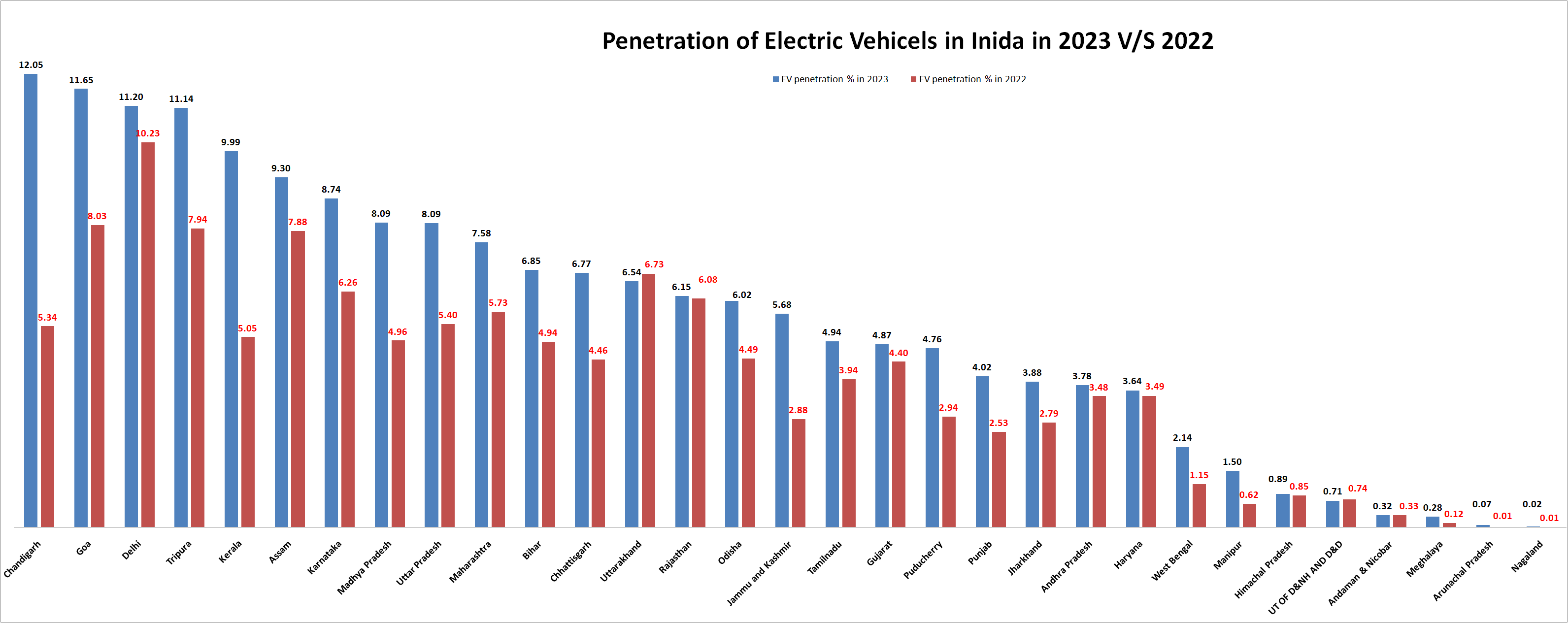
📌 Chandigarh has emerged as a front-runner in the national landscape of electric vehicle (EV) adoption, boasting an impressive 12.05% penetration rate in 2023. The city witnessed the sale of 6,393 EVs during the year, showcasing a substantial increase from the 5.34% penetration recorded in 2022, where 2,721 EVs found buyers.
📌 Goa closely followed suit, achieving an 11.65% penetration rate, selling 9,471 EVs in 2023—up from 8.03% in 2022, with 5,688 EVs sold. Delhi, with an 11.2% penetration rate and 73,624 EVs sold in 2023, outpaced its 2022 performance of 10.23% penetration and 62,257 EVs sold.
In the category of states and union territories with over 10,000 EVs sold in 2023, Delhi led the charge.
📌 Kerala showcased a commendable 9.99% penetration rate in 2023, selling 75,548 EVs—a significant surge from the 5.05% penetration recorded in 2022, where 39,619 EVs were sold.
📌 Assam, with a 9.3% penetration rate and the sale of 60,802 EVs in 2023, exhibited growth from the 7.88% penetration recorded in 2022, with 40,720 EVs sold.
States and union territories with EV sales below 1% penetration include
📌 Himachal Pradesh: 1128 EVs
📌 UT of D&NH and D&D: 160 EVs
📌 Andaman & Nicobar: 26 EVs
📌 Meghalaya: 114 EVs
📌 Arunachal Pradesh: 21 EVs
📌 Nagaland: 6 EVs
Noteworthy sales increases in states with over 10,000 EVs include West Bengal (92.22%), Kerala (90.6%), and Madhya Pradesh (84.06%).

In a groundbreaking shift, 2023 witnessed the electrification of commercial 2-wheelers, with a whopping 8,59,461 units sold.
Among them, 2,048 were designated for commercial transport, and 56 were specially crafted for differently-abled individuals.
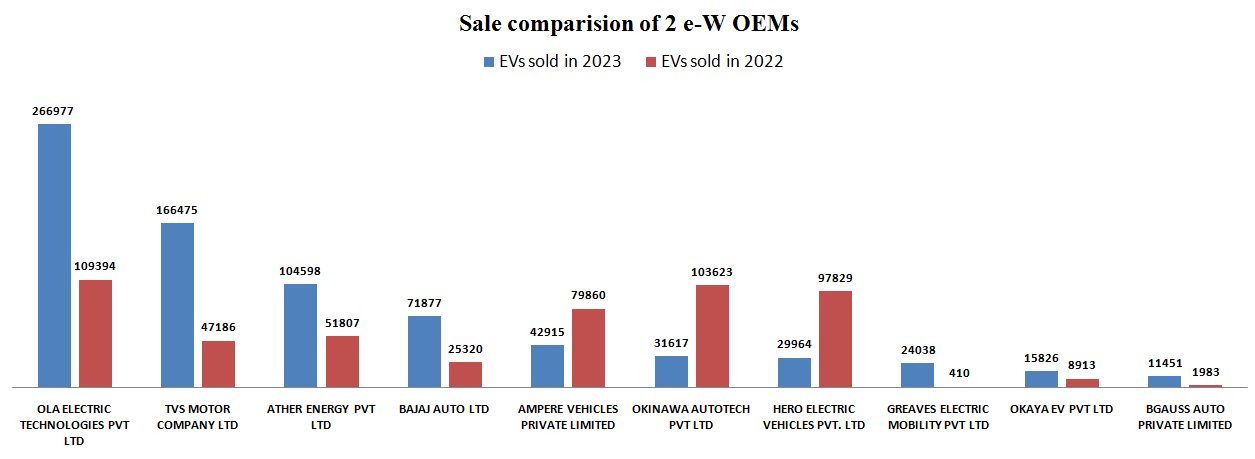
Dominating the private 2W sector were Ola Electric Technologies Pvt Ltd (2.67 lakh), TVS Motor Company Ltd (1.66 lakh), and Ather Energy Pvt Ltd (1.05 lakh), collectively crossing the million-unit mark.
In the commercial 2W category, Ola Electric Technologies Pvt Ltd (855), Quantum Energy Ltd (525), and Hero Electric Vehicles Pvt. Ltd (159) led the pack.
While Ola Electric Technologies, TVS Motor Company, Ather Energy, Bajaj Auto Ltd, Okaya EV Pvt Ltd, and Bgauss Auto Private Limited saw remarkable sales growth, Ampere Vehicles Private Limited, Okinawa Autotech Pvt Ltd, and Hero Electric Vehicles Pvt. Ltd experienced a decline compared to the previous year.

Navigating the currents of the electric vehicle landscape, the 3-wheel segment charted remarkable figures in 2023, witnessing a robust adoption of electric mobility. The total sales amounted to 5,82,121 units, predominantly comprising 4,73,720 passenger vehicles.
Spearheading this transformative journey were eminent players, namely YC Electric Vehicle (40,655), Mahindra & Mahindra Limited (37,925), and Saera Electric Auto Pvt Ltd (29,322).
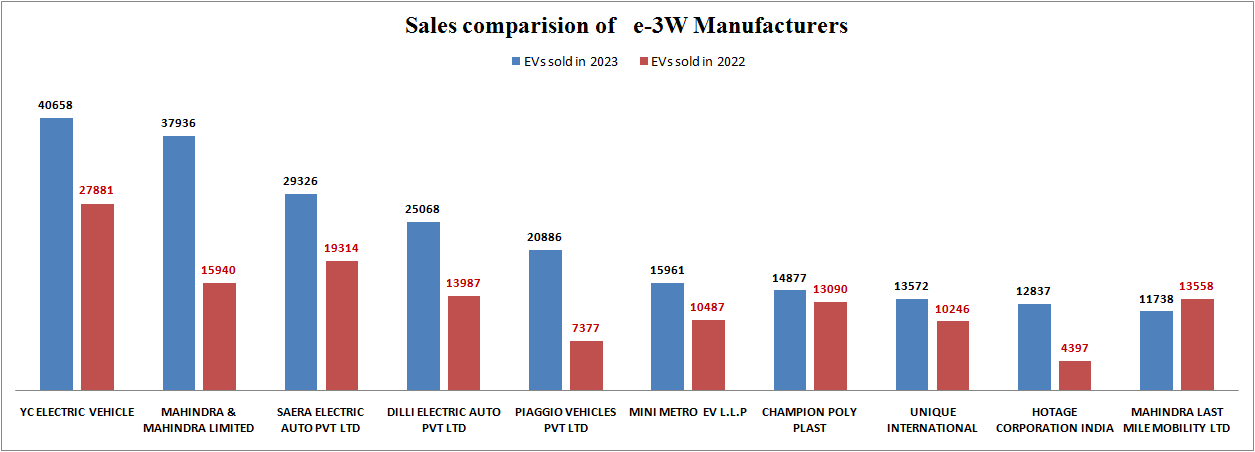
Among the top 10 manufacturers in the 3W domain, YC Electric Vehicle, Mahindra & Mahindra Limited, Saera Electric Auto Pvt Ltd, Dilli Electric Auto Pvt Ltd, Piaggio Vehicles Pvt Ltd, Mini Metro EV L.L.P, Champion Poly Plast, Unique International, and Hotage Corporation India exhibited a notable surge in sales during 2023 compared to the preceding year.

Unveiling a paradigm shift in the automotive realm, the 4-wheel electric vehicle domain witnessed an impressive stride in 2023 with a total of 72,757 units sold.
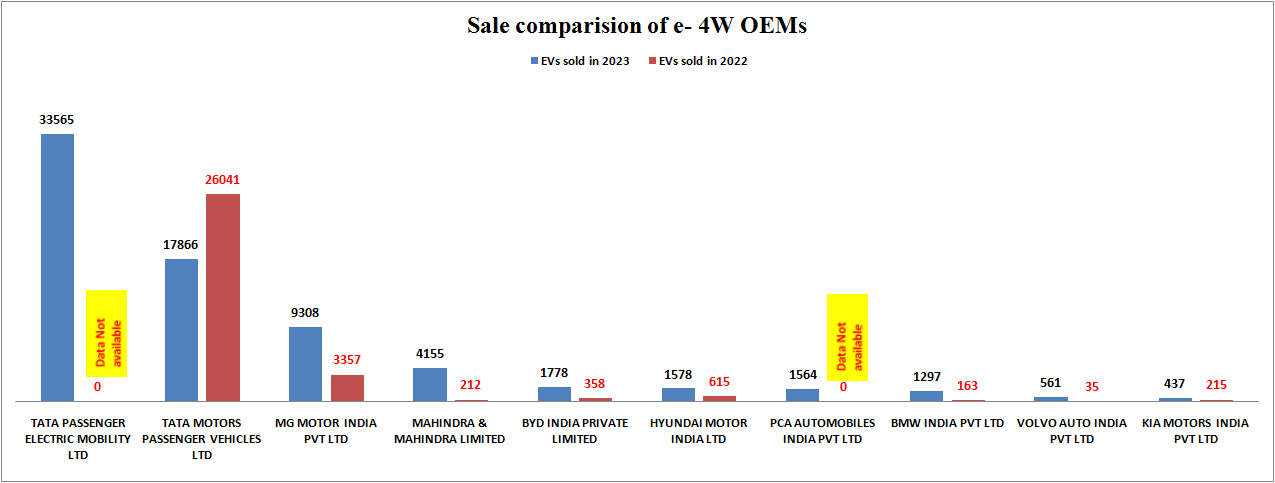
Pioneering this revolution were distinguished Original Equipment Manufacturers (OEMs), led by Tata Passenger Electric Mobility Ltd, which secured a lion’s share with 33,437 units. Following suit were Tata Motors Passenger Vehicles Ltd (17,864), MG Motor India Pvt Ltd (9,275), and Mahindra & Mahindra Limited (4,148), solidifying their positions as trailblazers in the dynamic landscape of 4-wheel electric mobility.
This data reflects a burgeoning acceptance and integration of electric vehicles into the mainstream automotive market.

Embarking on a transformative journey, the electric vehicle landscape in India has witnessed a monumental shift by 2023. The once novel sight of 2W and 3W EVs has seamlessly become part of the urban fabric, evolving from an anomaly in 2020 to a commonplace occurrence.
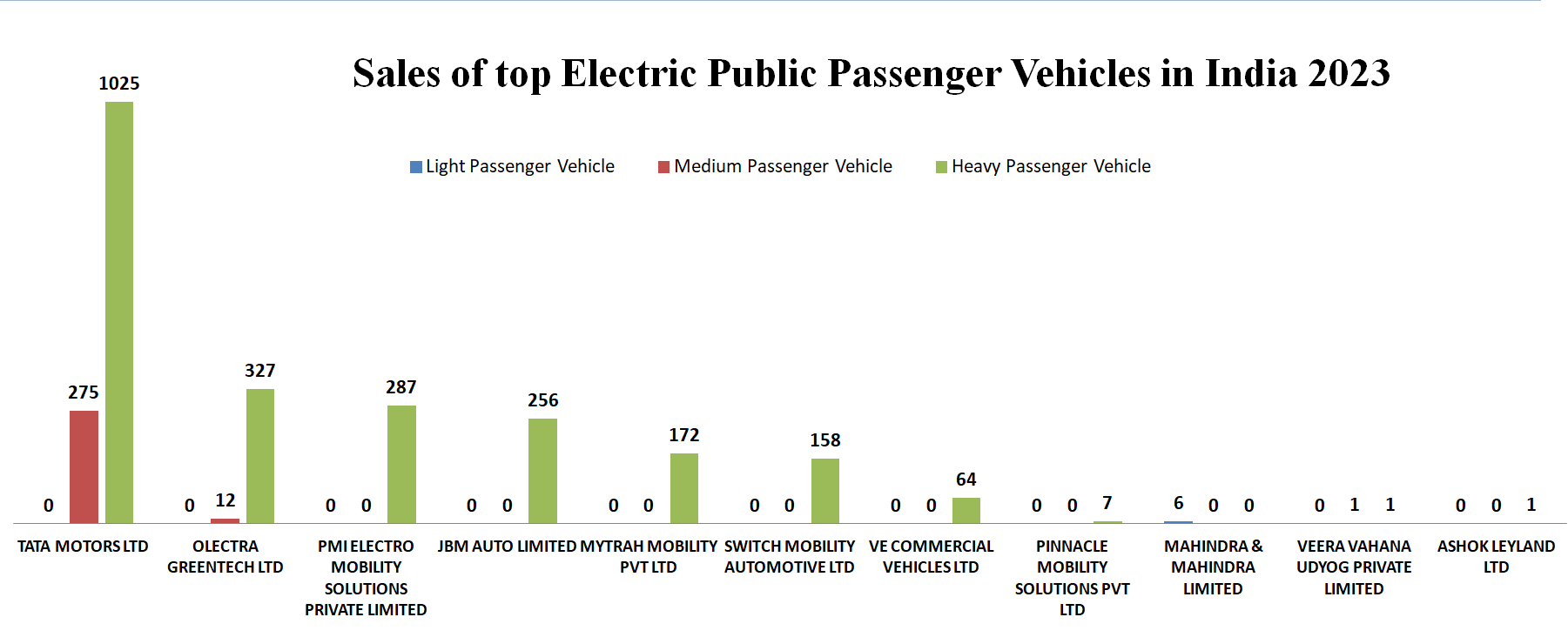
The turning pages of progress reveal a remarkable surge, with 2,592 e-buses and various passenger vehicles gracing the electric public transportation sphere. This transition is underscored by the presence of 288 medium and 2,298 heavy electric passenger vehicles, signaling a concerted effort toward sustainable mobility.
Within the Public Service Vehicle domain, a select group of manufacturers has spearheaded this revolution.
Tata Motors Ltd: 1,025 units
Olectra Greentech Ltd: 327 units
PMI Electro Mobility Solutions Private Limited: 287 units
Notable contributions also come from JBM Auto Limited (256), Mytrah Mobility Pvt Ltd (172), Switch Mobility Automotive Ltd (158), and VE Commercial Vehicles Ltd (64), all making strides in shaping the landscape of electric public transportation.
Diversification into Goods Vehicles and Beyond
Fuelled by remarkable numbers and a positive outlook, the electric vehicle industry celebrates the inclusion of 2,701 light goods vehicles and 304 heavy goods vehicles, surging past the 3,000-mark for electric goods vehicles.
Standout performers include BYD India Private Limited in the Heavy Goods Vehicle category and Tata Motors Ltd in the Light Goods Vehicle category, symbolizing a robust future for sustainable transport.
The industry’s diversification is evident with 16 special category vehicles, featuring All Terrain Cranes, accounting for 6 out of the total EVs sold in the category. Moreover, 8 electric tractors introduced in 2023, with Escorts Limited selling 5 out of 8, offer a promising solution to alleviate farmers from escalating fuel prices. In this journey of innovation and progress, in the present market, the absence of electric ambulances and construction equipment vehicles open up new possibilities, inspiring the industry to pioneer transformative solutions.

As of November 2023, India has made significant strides in establishing its electric vehicle (EV) charging infrastructure, with a total of 10,185 registered EV charging stations in the Bureau of Energy Efficiency (BEE) database.
Maharashtra leads the nation with an impressive count exceeding 3,000 charging stations.
Delhi with over 1,800
Karnataka with a tally surpassing 1,000
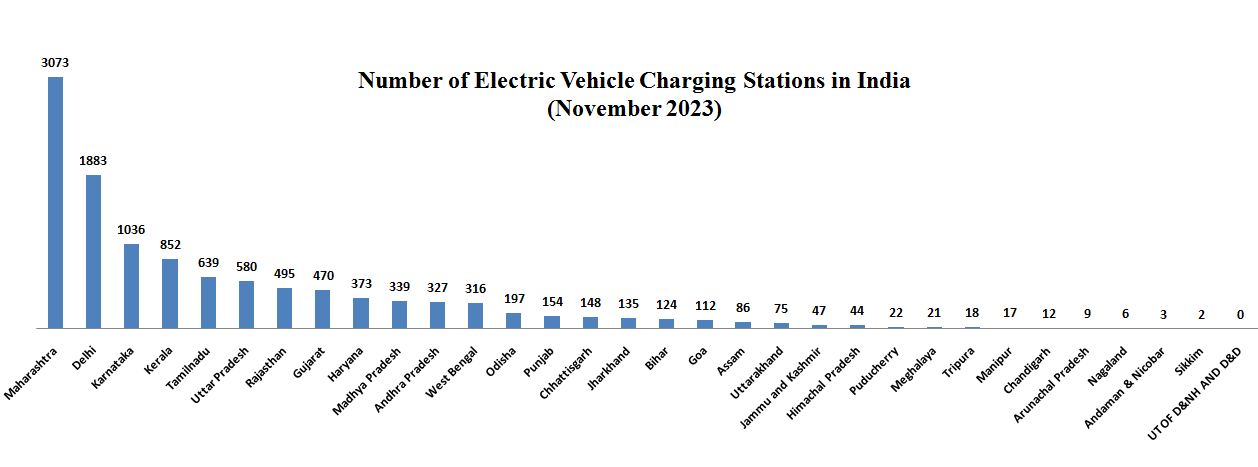
Pune emerges as a frontrunner on the district level, boasting the highest number of EV charging stations in the country. The city, recognized for its forward-looking approach to sustainable mobility, takes the lead with a remarkable count of 1,894 charging stations. This distribution highlights a concerted effort towards creating a robust charging network, facilitating the seamless integration of electric vehicles into the national transportation ecosystem.
Conclusion
In this transformative journey, the surge in electric vehicle adoption paints a portrait of hope and progress for India’s automotive future. With over 15 lakhs EVs navigating the roads in 2023, our nation is not just envisioning but actively crafting a sustainable tomorrow. As the wheels of change turn across diverse segments and a robust charging infrastructure emerges, the path forward gleams with promise. In closing, India’s dream of 30@30 is not a distant aspiration; it is unfolding in real-time, with each electric vehicle propelling us into a cleaner, greener, and more vibrant era of mobility.
Er. Neha Sakka: Trust EV Awareness Oath-Empowering Youth & Jaipur Discom (State Nodal Agency for Rolling out of EV Charging Station in Rajasthan)
